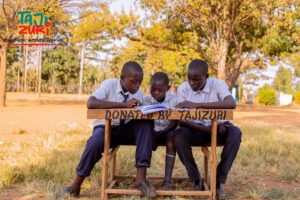A Typical Morning in Homabay
It’s early morning in a village in Homabay County. A mother is getting her daughter ready for school. There’s no breakfast yet, the uniform is still wet, and the child is sleepy. The mother is tired too; she has work to do before heading to the market. But one thing is clear: she wants her child to go to school.
This is a common scene across Homabay. Many parents understand the importance of education but face real-life challenges like poverty, long distances to school, teenage pregnancies, and lack of support at home. In these tough conditions, positive parenting becomes a powerful tool to help children stay in school and succeed.
What Is Positive Parenting?
Positive parenting means raising children with both love and guidance. It’s not about being overly strict or letting kids do whatever they want. It’s about finding the right balance between setting rules (authority) and showing care (affection). When parents combine discipline with emotional support, children grow up feeling safe, respected, and motivated. This helps them do better in school and life.
The Educational Challenges in Homabay
According to the Kenya National Examinations Council (KNEC) and the Ministry of Education, many students in Homabay struggle with:
Poor school attendance
Low literacy levels
High dropout rates
Teenage pregnancy
Long distances to school
In some homes, parents believe that their role ends at providing food and shelter. They may not know how to support learning at home. Others use harsh discipline like beating, which can harm a child’s confidence and desire to learn.
A teacher from Rangwe Sub-County said: “Some parents think love means just feeding their children. They don’t ask how the child is doing in school.”
But when parents start engaging — asking about school, checking homework, or simply talking to their children things begin to change.
Two Pillars of Positive Parenting: Authority and Affection
1. Authority – Teaching Discipline with Respect
Authority means setting clear rules, explaining why they matter, and guiding children towards good choices. It’s about being firm but fair.
In many families in Homabay, strictness often comes in the form of corporal punishment, such as hitting or yelling. But organizations like UNICEF and the Ministry of Education now encourage positive discipline, teaching through calm correction and logical consequences instead of fear or pain.
For example: Instead of hitting a child who didn’t finish homework, a parent might take away TV time and explain why schoolwork matters.
Children raised this way are more likely to:
Attend school regularly
Finish assignments
Show respect to teachers and classmates
A teacher in Suba South said: “When parents set clear rules at home, children come to school more focused and ready to learn.”
2. Affection – Showing Love and Emotional Support
Affection means showing love, listening to your child, praising effort, and offering comfort when needed. Even small actions — like asking “How was school today?” or giving a hug — make a big difference.
A report by Plan International Kenya found that children who feel loved and supported at home:
Are more confident
Participate more in class
Handle stress better
Have fewer behavior problems
One father from Karachuonyo shared: “I used to think parenting was only for mothers. But when I started spending time with my son, his school marks improved.”
Why Balance Matters
Parenting works best when there’s a balance between authority and affection.
Too Much Authority Without Warmth leads to:
- Children living in fear
- They may stop talking to parents
- Some drop out of school because they feel unloved
Too Much Affection Without Rules leads to:
- Children becoming undisciplined
- They may refuse to follow instructions
- Lack structure in daily life
A simple rule to remember: “Parenting is like walking with two legs — authority and affection. Limp on one, and the journey becomes harder.”
The Ministry of Education reports that children with both discipline and emotional support are more likely to:
- Stay in school
- Perform better academically
- Develop strong character and confidence
Real-Life Examples from Homabay
A Mother Who Made a Change
A mother from Ndhiwa changed how she interacted with her children. She began talking to them every evening and checking their books: “I saw a big change. They became more serious with school.”
A Father Who Got Involved
A father in Karachuonyo started helping his son with homework and attending school meetings: “His school marks improved.”
These stories show that even small changes in parenting can lead to big improvements in education.
Practical Tips for Parents in Homabay
Here are a few simple steps parents can take to support their children’s learning:
Have a daily routine
Set regular times for meals, homework, and sleep.
Praise effort, not just results
Say things like “You worked hard” or “I’m proud of you.”
Correct calmly
Talk to your child, explain mistakes, and guide them towards better choices.
Ask about school every day
“What did you learn today?” shows your child that school matters.
Visit the school
Meet teachers and attend PTA meetings.
Spend quiet time together
Just 10 minutes of focused attention makes a big difference.
Be a role model
Children learn by watching adults. Show kindness, patience, and responsibility.
Call to Action: You’re Not Alone
Parents in Homabay don’t have to raise children alone. Schools, churches, local leaders, and organizations like UNICEF, Plan International, and the Ministry of Education offer support.
You can:
Join a parent support group
Attend school meetings
Ask for parenting training in your community
Share knowledge with other parents
Together, families and communities can create a better future for children one where they not only attend school, but thrive in it.




